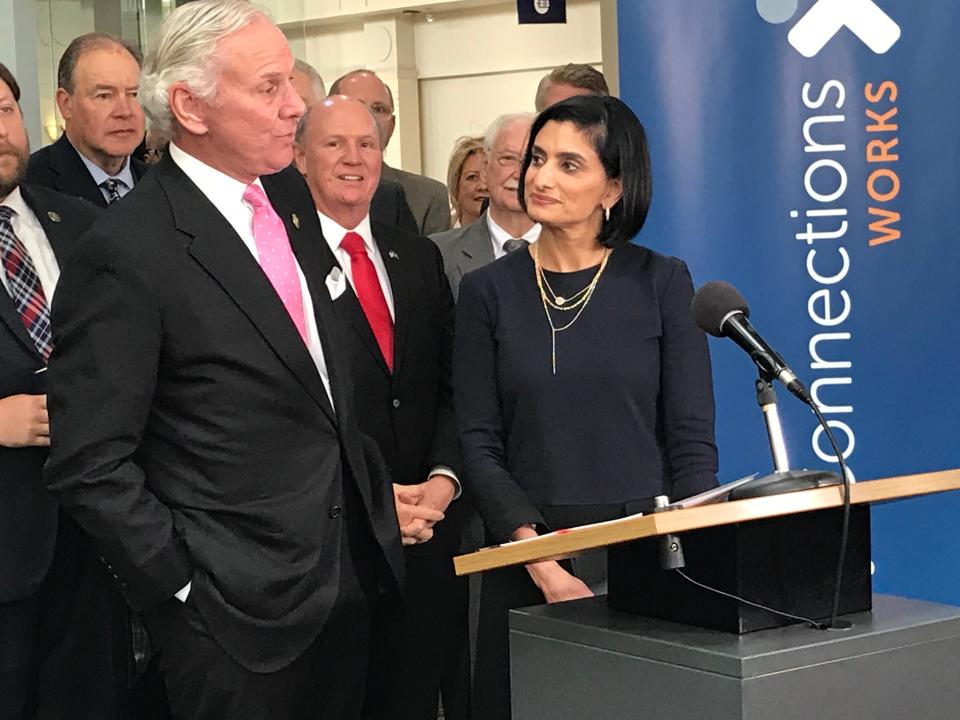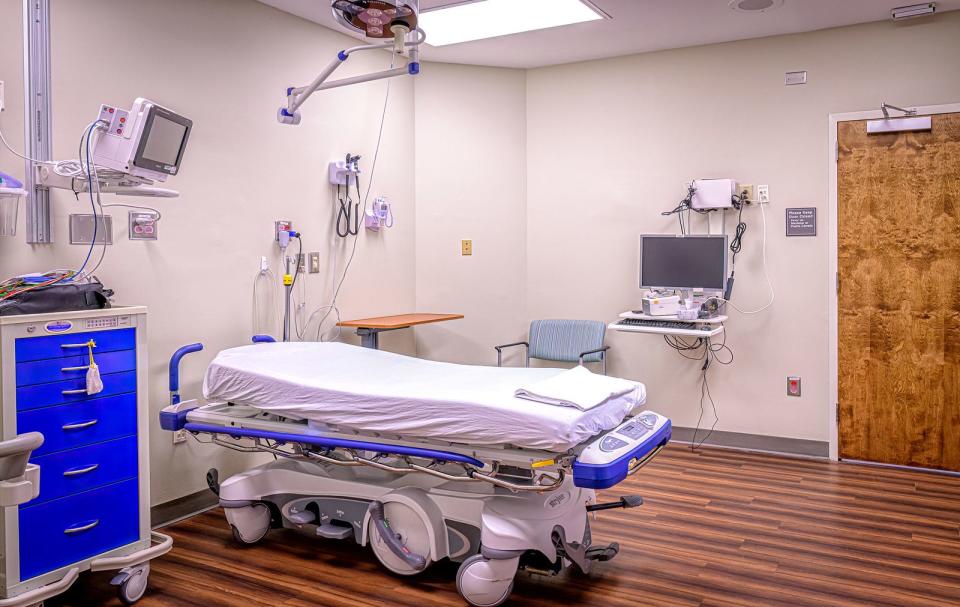More than 200,000 SC residents could lose Medicaid coverage starting this week.
Thousands of South Carolina residents might lose Medicaid coverage starting Thursday, June 1.
The rise in the number of uninsured residents has revived efforts to consider Medicaid expansion.
During budget deliberations in the House earlier this month, Upstate lawmaker Rosalyn Henderson Myers, D-Spartanburg, asked lawmakers to consider the fate of those who might find themselves uninsured.
She filed an amendment to form a study committee to analyze the state's experience with Medicaid ― whether it needed improvements and whether expansion was right or wrong for the state. North Carolina expanded Medicaid earlier this year and the House was gearing up to discuss the six-week abortion ban.
"A lot of assistance comes through Medicaid particularly for mothers and prenatal care," Henderson-Myers said. "It's very important that we make sure that we take care of our people, particularly mothers."
Dig deeper: As states cut Medicaid, some fear they'll mistakenly end coverage for millions of eligible people

The South Carolina Department of Health and Human Services anticipates close to 250-300,000 members will be disenrolled by next year, which will roll back enrollment numbers from 1.3 million to pre-pandemic levels at just over 1 million. The agency's budget request showed that it services approximately 60% of the births in the state.
Meanwhile, KFF, a non-partisan health research organization, estimated close to 214,300 Medicaid losses. Adults made 60% of the losses, with 40% (86,300) children.
Rep. Roger Kirby, D-Florence, told Henderson-Myers the state is not tapping into $15.8 billion by rejecting expansion.
"That's a lot of money left on the table," Henderson-Myers responded.
But the House chamber tabled Henderson-Myers' amendment.

SC Republican's anti-Medicaid stance
The Republican-controlled Statehouse has been a vocal opponent of Medicaid expansion. Gov. Henry McMaster has previously argued that expansion was not a financially feasible option for the state. Early in 2021, the governor and Republican-controlled legislature denied an incentive in the COVID-19 relief money legislation that would increase the federal government's share of paying for Medicaid expenses for two years.
Currently, the federal government covers 70% of the costs in South Carolina for those who qualify under the program. The state is obligated to match 30%. But with expansion, the federal government would cover 90% of Medicaid costs and it would lower the state's burden to 10%.
Dan Tsai, director of Center for Medicaid and CHIP services, said hundreds of Americans were expected to lose their coverage in the next year but some would still remain eligible for ACA's federal marketplace coverage. This could still be a free or cheaper option due to subsidies. Marketplace coverage begins at the 100% federal poverty threshold.
However, those who make less than 100% of the poverty level and more than 67% will still fall in a "coverage gap," where they may not qualify for any type of subsidized coverage.
"It's a hard thing to come to terms with but that is part of the case where there is not a Medicaid expansion," Tsai said.
The renewal process is not new, though it has been on a hiatus for the past three years.
When the COVID pandemic began in March 2020, the federal government passed the Families First Act. They sent additional Medicaid funding to help states ride out the public health emergency on the condition states stop disenrolling people. First-time Medicaid users became beneficiaries after losing their jobs and enrollment numbers climbed.
Then, in Dec. 2022, the federal government rolled back emergency regulations and states were free to resume eligibility reviews.
Expanding care: Closed for 2 years, North Greenville Hospital emergency department reopens with new services

Here's how lack of Medicaid expansion could effect SC residents, families
About 92 million people are enrolled in Medicaid nationwide. South Carolina services 1.3 million. The federal government estimates 15.8 million people will lose Medicaid coverage after states make their decisions.
According to a Jan 2023 KFF analysis, the last time Medicaid recipients faced disenrollment, 65% of the people remained uninsured for varying lengths of time within a year.
About 26% were able to obtain another health insurance option for a full year. Among the disenrolled, 41% re-enrolled with insurance within the year. Just over a third found their back to Medicaid, suggesting residents who are eligible could still risk losing coverage. Sue Berkowitz, director at SC Appleseed Legal Justice Center, said it was important to remember income fluctuations follow a person through their lifetime. She said it is possible that some who were able to find other sources of coverage are unable to retain it later.
Once the disenrollment process ends, families will have to contend with narrow eligibility criteria due to the lack of Medicaid expansion, she said.
McMaster has previously said that using more federal funds would mean the state would be obligated to pay large sums of money back, leading to financial distress. The state spends nearly a quarter of its state funds on Medicaid, per the 2022 budget.
Clemson University Professor Scott Barkowski said at the current 90:10 split, Medicaid expansion was an affordable option for the state.
"This basically represents an injection of money into the state from outside sources. You could think of it as being the same as tourism dollars," Barkowski said. "The expansion provides coverage and health care, and payment for services to S.C. hospitals, doctors and pharmacies. The vast share of it comes from out of state." For every $1 spent on state funding, the federal government would give the state $9 back. "I think the economics here, the finances make so much sense that it's kind of foolish not to do it, he said. If the split changed in the future, then maybe the argument becomes less convincing, he said.
A 2021 South Carolina Institute of Medicine and Public Health report found older residents experienced worse health outcomes compared to culturally and demographically similar states, like Louisiana and Kentucky, that opted to expand Medicaid.
The research found affordable and early preventive services to screen diseases such as diabetes, Alzheimer's and cancer. It also found that screening for heart diseases, which disproportionally affect non-Hispanic, Black residents, could reduce health expenses later in life.
Barkowski said Medicaid coverage could serve the American healthcare system by soaking up patients with expensive medical needs. In which case, for-profit private insurance company may benefit from not having to paying for costly services and have the federal government lift the monetary burden.
Researchers at MIT, Dartmouth College and Harvard University studied Oregon's health insurance system and found Medicaid payments also guaranteed a lower percentage of care went uncompensated.
For instance, if a person was uninsured and broke their arm, they would have to go to the emergency room and figure out a way to pay the bill out of pocket.
The hospital would send them to collections, but if they couldn't pay the whole amount, the hospital has no option but to eat the cost.
"And how do they cover that? Well, they essentially charge others more to cover the cost of that uncompensated care," Barkowski said.
Devyani Chhetri covers SC politics for the Greenville News. Reach her via email at dchhetri@gannett.com.
This article originally appeared on Greenville News: More than 200,000 SC residents could lose Medicaid starting this week

